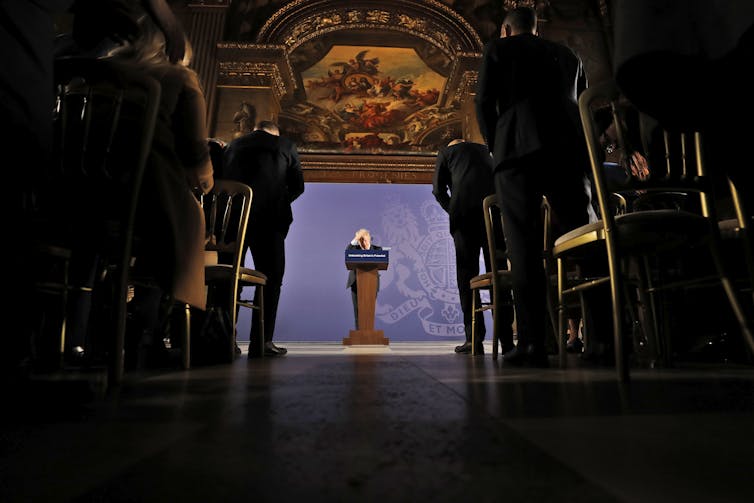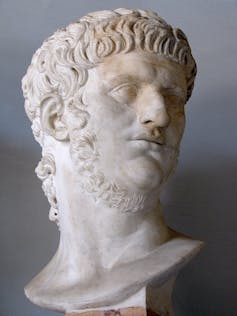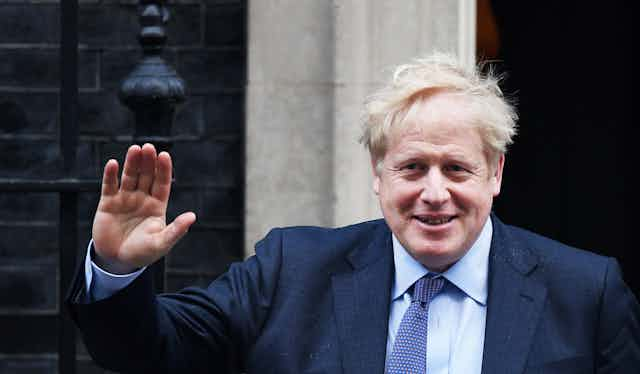Boris Johnson has promised the UK a “new age” since becoming the country’s prime minister. Sometimes this can only be achieved with some thorough spring cleaning: Johnson’s cabinet purges may remind us of the bloodier and more far-reaching proscriptions of Rome’s first emperor, Augustus.
Johnson imitates Roman emperors’ tactics in other ways. On the eve of Brexit, he addressed the nation with glowing optimism for the future:
The most important thing to say tonight is that this is not an end but a beginning. This is the moment when the dawn breaks and the curtain goes up on a new act. It is a moment of real national renewal and change.
Roughly 1700 years ago, a Roman commander named Carausius led a rebellion against continental power to establish his own empire in Britain. He too sought his subjects’ confidence in his ability to preside over an era of peace and stability, and broadcast his message through a series of coins that proclaimed him “Restorer of the Age”.
Johnson and Carausius both participate in a common form of political rhetoric: an attempt to legitimise one’s authority by demonstrating power and ability to usher in a “new age” for one’s country. New leaders will often try to portray themselves and their governments as uniquely gifted to end old quarrels, make new trade agreements, secure borders, and bring about a period of prosperity and general well-being.
New age rhetoric by definition focuses on beginnings, not endings, as Johnson does. This is smart. Any attention to the close of an opponent’s “reign” or era highlights the fact that the new leader’s own period of power will come to an end, very possibly due to his own failures and rejection by fellow citizens. If Johnson was to dwell on earlier conflicts, he would detract from his promises of future concord: painful memories should be set aside, old wounds glossed over.

But new age rhetoric can never fully reject the past: it must acknowledge the values and traditions of one’s society. Hence the need to link “newness” to renewal and restoration, as Johnson does (and Carausius). “Progress”, in this sense, means a return to the good things of an idealised bygone time, a “Golden Age”, with a few tweaks and changes to keep pace with the modernised world.
Old new age
Such tactics are probably as old as time. Carausius borrowed the idea from earlier emperors, particularly Augustus, who created a religious festival in 17 BC to celebrate his new age of peace after a long civil war.
Johnson certainly has a few British models: during a speech at a Conservative rally in 1979, Margaret Thatcher spoke of a “new age” for her party. And in 2017, Theresa May urged the US to “renew the Special Relationship for this new age”. Labour can use this rhetoric, too, as Harold Wilson did in 1967 in his address to the Parliamentary Assembly of the Council of Europe, calling for a “new age of enfranchisement”.
But Johnson’s rhetoric is more extravagant than that of his predecessors, and occurs at critical, emotionally charged moments in his political career. On July 25 2019, in his first address to the Commons as prime minister, Johnson proclaimed the “beginning of a new golden age”. After his first Queen’s Speech on October 14 2019, he told the Commons that delivering Brexit by October 31 meant a “new age of opportunity for the whole country”. And on December 19 2019, in the same context, Johnson reiterated that “a new golden age for this United Kingdom is now within reach”.
Like Augustus, Johnson understands that a long and bitterly divided nation craves stability and settlement – and is therefore more easily swayed by excessive promises of novelty. But any new age needs to be delivered swiftly and successfully, and the rhetoric grows stale if used too frequently. The emperor Philip I (also known as Philip the Arab) celebrated a new age in the year 248 and was killed soon after, ushering in decades of civil strife in which dozens of competing emperors, including Carausius, announced their “new age” on coins during their pitifully short reigns.
So Johnson’s successors will have to avoid new age tactics as a cliché. A new challenger to Johnson can still set out plans for the future with hopeful and persuasive rhetoric, but could pair this with a very different strategy: apologies for the past mistakes of one’s party.
The greats
Johnson may be aware of the connection between his rhetorical style and the official communications of Roman emperors. His degree at Oxford was in Literae humaniores, nicknamed “the greats”: an undergraduate course focused on classics. This serves him as a form of social capital (and it’s worth noting that such training was pursued by young men from elite Roman families in preparation for government careers).

He has also mastered the art of self-presentation: his signature hairstyle makes him easily recognisable to the masses. One is reminded of the myriads of busts scattered across Rome’s empire bearing Augustus’s perfectly dishevelled locks or Nero’s unfortunate neckbeard New age rhetoric is only one facet of Johnson’s stage presence.
Is Johnson’s new age rhetoric successful? It certainly didn’t harm the Tories in the last election. “I really think he will lead the world into a new age” exclaimed one celebratory Londoner. But any kind of highly dramatic rhetoric is vulnerable to parody: the philosopher Seneca wrote mockingly of the Emperor Claudius’s death as “the beginning of a most happy age”, turning official pronouncements on their head.
This is no less true today in political commentary. Whether we like it or not, Johnson has brought the UK to a new age: only time can tell if it will be golden or gilded.

